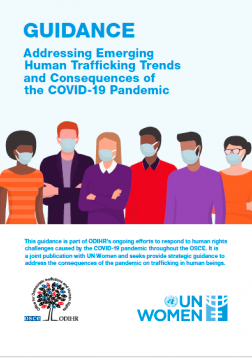“Human trafficking is always invisible. During a pandemic, it is easier to have cases going on that nobody reports.” Frontline Stakeholder from Portugal. The COVID-19 pandemic created new risks and challenges to victims of trafficking (VoTs) and survivors of trafficking, as well as having exacerbated the vulnerabilities of at-risk groups to trafficking. To analyze emerging trafficking in human beings (THB) trends and dynamics and to develop a response based on empirical data to address the impact of the COVID-19 pandemic, ODIHR and UN Women conducted a global survey of (1) survivors of trafficking and (2) frontline stakeholders. Based on the survey findings and empirical data collected, a set of policy recommendations were developed. The survey findings indicate that through the COVID-19 pandemic and afterwards, exacerbation of vulnerability of women and girls to THB for the purposes of sexual exploitation will increase. Online recruitment, grooming and exploitation have been widely used by traffickers during the pandemic. There are also indications that trafficking for the purpose of sexual exploitation online, including the demand for Child Sexual Abuse Material (CSAM) has increased. The majority of anti-trafficking stakeholders and survivors of trafficking reported decreased accessibility of assistance and services for VoTs and survivors of trafficking. Frontline organizations experienced significant challenges in their activities during the pandemic due to additional barriers in co-ordination and co-operation with governmental institutions and law enforcement agencies; lack of financial resources; difficulties in reaching vulnerable groups; and suspension or postponement of planned prevention and awareness raising activities. The combination of these factors on the work of frontline anti-trafficking stakeholders negatively impacts prevention, prosecution, and protection efforts to combat trafficking in human beings (CTHB). Based on the survey findings and research, ODIHR and UN Women have developed policy recommendations to address the trends and consequences of the pandemic on CTHB covering the following areas:
1) strengthen the implementation of international legal frameworks;
2) develop effective implementation of National Referral Mechanism (NRMs) or equivalent systems to address the current THB trends and consequences of the COVID-19 pandemic;
3) develop and/or update of National Strategies and National Action Plans (NAPs) to CTHB to address the THB trends and consequences of the COVID-19 pandemic;
4) strengthen identification of VoTs to address the trends and consequences of the COVID-19 pandemic;
5) make services to VoTs and survivors of trafficking more accessible during and post pandemic;
6) provide access to remedies including justice and information;
7) address specific needs of women and girls;
8) address specific needs of children;
9) support and build capacity for both governmental and non-governmental frontline stakeholders;
10) strengthen efforts at THB prevention related to the pandemic;
11) implement measures to reduce THB after the pandemic.

